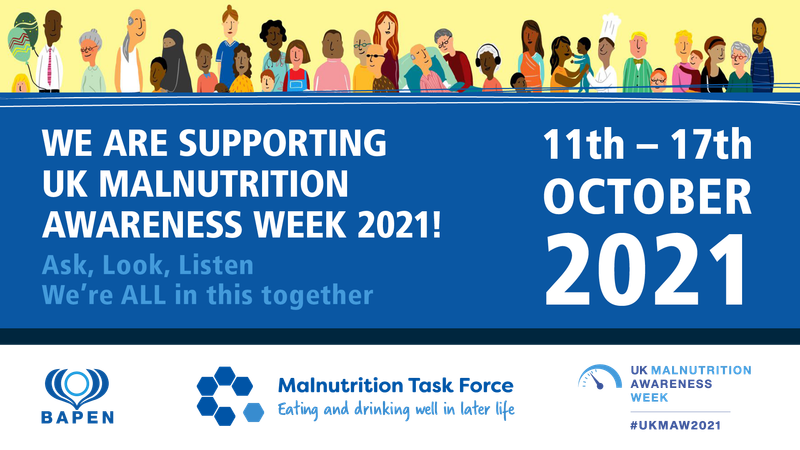
Posted on: October 11, 2021
Ask, Look and Listen - Malnutrition Awareness Week 2021
Malnutrition is a serious problem in modern Britain, estimated to affect at least three million people in the UK,[1] around 98% of whom are living outside the hospital setting. Malnutrition and dehydration are both causes – and usually consequences – of illness, so ensuring that patients receive adequate nutrition is critical for improving their overall health outcomes.
The effective management of malnutrition could have a significant impact on the health economy as the annual health and social care costs associated with malnutrition are estimated at nearly £20 billion in England alone.[2]
Malnutrition affects all ages, but it is particularly prevalent in later life. It is caused by insufficient dietary intake with disability and disease at the heart of the problem.[3][4] Food intake is often reduced because of the effects of disease and its treatment, for example, poor appetite, swallowing problems the side effects of drugs, or physiological reasons. As a consequence, patients and families suffer; patient’s quality of life is adversely affected; there’s an increase in hospital admissions and readmissions; and mortality rises.[5][6]
It’s important to identify individuals who are malnourished, or at risk of malnutrition, using a validated nutritional screening tool, such as the ‘Malnutrition Universal Screening Tool’ (‘MUST’).[7] The National Institute for Health and Care Excellence(NICE)Quality Standard (QS24),[8] NICE Clinical Guidance (CG32)[9] and the Managing Adult Malnutrition in the Community pathway[10] all recommend a multidisciplinary approach to the identification of people at risk of malnutrition and provision of timely nutrition support. This can include advice on eating well and food fortification, but for those where more support is needed and where a person is unable to receive adequate nutrition from food alone, foods specifically formulated to meet nutritional requirements may be prescribed.
BSNA represents manufacturers who produce medical nutrition, including oral nutritional supplements, enteral tube feeds, specialist infant formula and parenteral nutrition.
To find out more about medical foods, click here
To find out more about parenteral nutrition, click here
You can read more about MAW and how you can support it here.
#UKMAW2021
[1] Malnutrition Task Force (2012). Malnutrition in Later Life: Prevention and Early Intervention. Accessed online: www.malnutritiontaskforce.org.uk/wp-content/uploads/2014/07/CH-Prevention_Early_Intervention_Of_Malnutrition_in_Later_Life_Care_Home.pdf [2] Elia M, on behalf of Malnutrition Action Group of BAPEN and the National Institute for Health Research Southampton Biomedical Research Centre (2015). The cost of malnutrition in England and potential cost savings from nutritional interventions. Accessed online: www.bapen.org.uk/pdfs/economic-report-full.pdf[3] Gibbons T, Fuchs GJ (2009). Malnutrition: a hidden problem in hospitalized children. Clin Pediatr (Phila).;48(4): 356-361. [4] Stratton RJ, Green CJ, Elia M (2003). Disease-Related Malnutrition: An Evidence-Based Approach To Treatment. Wallingford: CABIPublishing. [5] Elia M, Russell C (2019). Combating malnutrition: recommendations for action. Nutrition Advisory Group on Malnutrition led by BAPEN. Accessed online: www.bapen.org.uk/pdfs/reports/advisory_group_report.pdf. [6] Stratton RJ, et al. (2006). 'Malnutrition Universal Screening Tool' predicts mortality and length of hospital stay in acutely ill elderly. Br J Nutr.; 95(2): 325-30. [7] BAPEN (2003). Malnutrition Universal Screening Tool ‘MUST’. Accessed online: www.bapen.org.uk/pdfs/must/must_full.pdf (May 2019). [8] NICE (2012). Quality Standard [QS24]. 2012. Nutrition Support in adults. Accessed online: www.nice.org.uk/guidance/qs24 (May 2019). [9] NICE (2006). Nutritional support for adults: oral nutrition support, enteral tube feeding and parenteral nutrition. Clinical guideline [CG32]. Accessed online: www.nice.org.uk/guidance/cg32 (May 2019). [10] Malnutrition Pathway (2017). Managing Adult Malnutrition in the Community: Including a pathway for the appropriate use of oral nutritional supplements (ONS). Produced by a multi-professional consensus panel. Accessed online:http://malnutritionpathway.co....